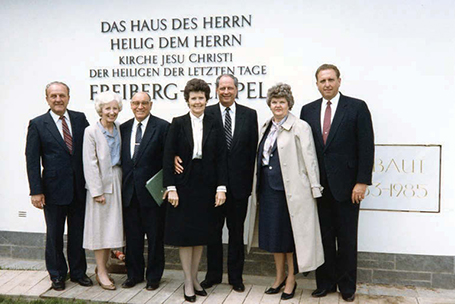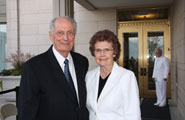Download: Small (360p), Medium (720p), Large (1080p)
Elder Robert D. Hales, who served as a member of the Quorum of the Twelve Apostles since 1994 and as Presiding Bishop of the Church from 1985 until his call to the Twelve, passed away on October 1, 2017. He is survived by his wife, Mary Crandall Hales, and their two sons.
Watch the funeral service held October 6, 2017, in the Salt Lake Tabernacle.
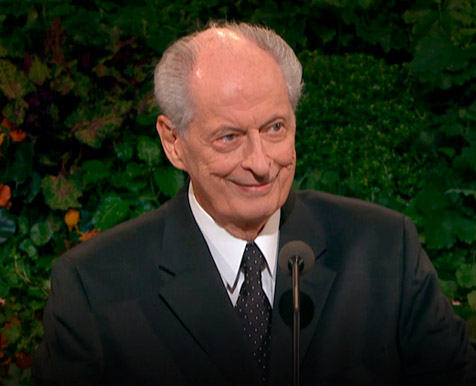
- A Close Family
- His Greatest Asset
- “You Will Have Many Missions”
- Teachings and Testimony
- Waiting on the Lord
- A Faithful Disciple
When Elder Robert D. Hales served as a jet fighter pilot in the U.S. Air Force during the 1950s, members of his squadron adopted a motto to inspire them in their duties.
“Our unit motto—displayed on the side of our aircraft—was ‘Return with Honor,’” Elder Hales told priesthood holders in 1990 while serving as Presiding Bishop. “This motto was a constant reminder to us of our determination to return to our home base with honor only after having expended all of our efforts to successfully complete every aspect of our mission.”2
Robert Hales served as a jet fighter pilot in the U.S. Air Force during the 1950s. He exemplified his unit’s motto, “Return with Honor,” throughout his life.
Elder Hales, who spoke often of returning with honor, believed that all of Heavenly Father’s children could be helped along their eternal path by applying this motto in their lives. Because each day of life is a mission, he taught, “We need to remember who we are and our eternal goal to ‘Return with Honor,’ with our families, into the presence of our Heavenly Father.”3
In his duties as a husband and father, business executive, and General Authority of The Church of Jesus Christ of Latter-day Saints for more than 40 years, Elder Hales remembered who he was and acted accordingly. And through his faithfulness, obedience, diligence, and service, he exemplified his squadron motto throughout his mortal life.
A Close Family
Robert Dean Hales was born in New York City, USA, on August 24, 1932, the third of three children born to J. Rulon Hales and Vera Marie Holbrook Hales. Robert grew up on nearby Long Island in a gospel-centered home. His parents served in a variety of Church callings, including as stake missionaries, and every Sunday the family traveled 20 miles to attend the Queens Ward.
“We were a close family,” recalled Elder Hales. He called his boyhood home “a beautiful place to grow up” and his family “a source of strength.”4
The good examples set by his parents became memories that guided his life.5 “They lived the gospel, studied the scriptures, and bore testimony of God the Father and his Son Jesus Christ,” said Elder Hales. “They also bore testimony of the Prophet Joseph Smith.”6
At a young age he learned that “the key to strengthening our families is having the Spirit of the Lord come into our homes.”7
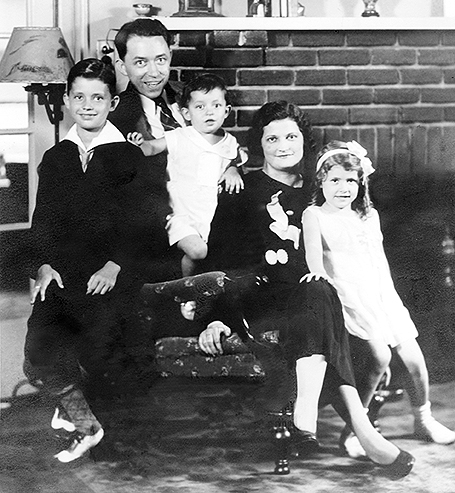
Robert Hales as a toddler with his father, J. Rulon Hales; mother, Vera Marie Holbrook Hales; brother, Gerald; and sister, Janet.
His mother, who served more than 30 years in the Relief Society, taught Robert love and service as she took him with her to serve the poor and needy.8 His father, a professional artist in New York City, taught Robert lasting lessons about the priesthood and the Restoration. On one occasion, he took Robert to the Susquehanna River, where Joseph Smith and Oliver Cowdery had received the Aaronic Priesthood from John the Baptist. On another occasion, he took Robert to the Sacred Grove.
“We prayed together in the grove and expressed our desire to be true and faithful to the priesthood which we held,” he recalled. “Father later painted a picture of the place where we had prayed and gave it to me as a reminder of our promises made that day together. It hangs in my office today and serves as a reminder each day of my sacred experience and promises made with my earthly father as well as my Heavenly Father.”9
As a young man, Robert loved to play baseball, eventually playing for the University of Utah. On the bus ride home after his first out-of-town game with the high school varsity team, the ninth-grader was appalled by some of the behavior and language of his teammates. To strengthen Robert, his father drew him a picture of a knight.

As a young man, Robert loved to play baseball.
“As he drew and read from the scriptures, I learned how to be a faithful priesthood holder—to protect and defend the kingdom of God. The words of the Apostle Paul were my guide” (see Ephesians 6:13–17).
Reflecting on that lesson years later, Elder Hales taught, “If we are faithful in the priesthood, this armor will be given to us as a gift from God. We need this armor!”10
Elder Hales learned another important attribute from his father’s example.
“I learned respect for womanhood from my father’s tender caring for my mother, my sister, and his sisters,” he said. After Elder Hales’s mother suffered a stroke, his father’s “loving care for his cherished companion” the last two years of her life became an example he never forgot. “He told me it was small payment for over fifty years of my mother’s loving devotion to him.”11
His Greatest Asset
While home from college in 1952, Robert met a young woman named Mary Crandall, whose family had recently moved to New York from California. The two liked each other immediately.
“After I met her, I never went out with anyone else,” Elder Hales recalled.12
When summer ended, both headed back to Utah for school. Robert attended the University of Utah while Mary went to Brigham Young University, but they did not let the distance keep them apart. Shortly after the school year ended, they were married in the Salt Lake Temple on June 10, 1953. Over the next five years they were blessed with two sons, Stephen and David.
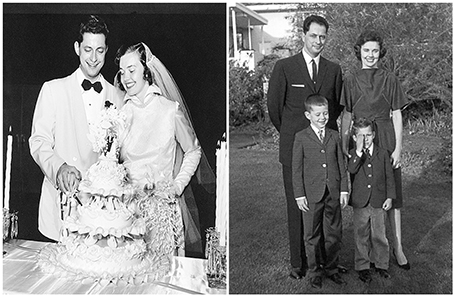
Robert D. Hales married Mary Crandall on June 10, 1953, in the Salt Lake Temple. Over the next five years they were blessed with two sons, Stephen and David.
After Robert graduated in 1954 with a degree in communications and business, he went on active duty in the air force, serving as a jet fighter pilot. When his service ended nearly four years later, he moved his family from Florida to Massachusetts to pursue a master’s degree in business administration. While stretched to his capacity at Harvard Business School, he was called as elders quorum president. It is the only time in his life that he ever wondered if he should accept a Church calling.
“There is a chance of failing in my schooling if I become an elders quorum president,” he told Mary.
Mary responded with words that would help him the rest of his life: “Bob, I would rather have an active priesthood holder than a man who holds a master’s degree from Harvard.” Then she put her arms around him and added, “We’ll do them both.”13
And they did.
The next day Mary walled off a section of the unfinished basement of their apartment so that Robert would have a place to study without being disturbed.
“I put myself in the Lord’s hands when I made that decision” to accept the calling, Elder Hales said 30 years later. “That decision was much harder to make then than when, years later, I accepted the call to serve as an Assistant to the Twelve and left my business career behind.”14
Years later, after his family had become financially secure, Elder Hales planned to buy Mary an expensive coat. When he asked her what she thought of his planned purchase, she asked, “Are you buying this for me or for you?”
Elder Hales called her question “an unforgettable lesson.” He observed: “In other words, she was asking, ‘Is the purpose of this gift to show your love for me or to show me that you are a good provider or to prove something to the world?’ I pondered her question and realized I was thinking less about her and our family and more about me.”15

Elder Robert D. Hales and his wife, Mary, attend the dedication of the Oquirrh Mountain Utah Temple. Photo by Gerry Avant, Deseret News.
Elder Hales acknowledged that his wife was his greatest asset.16 “I would not be what I am without her,” he said. “I love her dearly. She has gifts of the Spirit. We study the scriptures together, and many of the concepts I teach have come because we have had companion study and prayer. That is why I am who I am.”17
Elder Hales attributed much of what he and Mary accomplished in life to their team relationship. “We always have been a team and always will be. I think listening to my wife, next to listening to the Holy Ghost, has been the most important influence in my life.”18
“You Will Have Many Missions”
After Robert graduated with his MBA in 1960, professional opportunities quickly came his way. During the next 15 years he served as a senior executive for several prominent companies in the United States. His distinguished business career took him and his family to several American cities as well as to England, Germany, and Spain. Those moves brought leadership callings in the Church, which Robert accepted willingly.
He served in branch presidencies in Spain, Germany, and in the United States in Georgia and Massachusetts. He served as a bishop in Frankfurt, Germany, and in Massachusetts and Illinois, USA. He served as a high councilor in London, England, and Boston, Massachusetts, where he also served in the stake presidency. In Minnesota and Louisiana, USA, he served as a regional representative.
In 1975, while attending a business board meeting, Robert received a note that President Marion G. Romney (1897–1988), then Second Counselor in the First Presidency, was on the phone. When Robert answered the phone, President Romney called him to serve as a mission president. Robert accepted the call, but before he could assume his duties later that year as president of the England London Mission, he received another call from Salt Lake City, this time from President Spencer W. Kimball (1895–1985).
“Do you mind if we ask you to serve longer than three years?” President Kimball asked. After Robert said he didn’t mind, President Kimball called him as an assistant to the Quorum of the Twelve Apostles.
“President Kimball told me he knew I was disappointed because I wanted to go out as a mission president,” Elder Hales said. But President Kimball reassured him, “Don’t worry about it; you will have many missions.”19
A year later, Elder Hales was called to the First Quorum of the Seventy. In that capacity three years later, he was called again to serve as president of the England London Mission and then as an area supervisor in Europe, working with Elder Thomas S. Monson to establish the gospel in nations that had been closed to the Church and to pursue the construction of a temple in East Germany.20
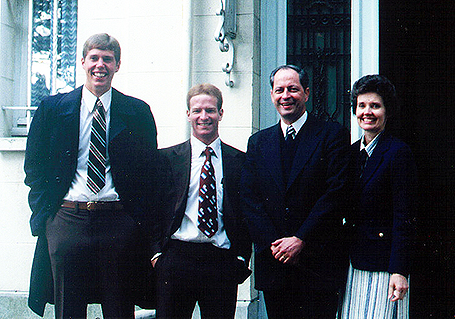
Robert D. Hales served as president of the England London Mission until 1979. Copyright Trilby Fox Cope.
“One of the great joys of my Church service came during the first three years as a General Authority as I helped plan twenty-seven area conferences,” said Elder Hales. “I loved traveling with members of the First Presidency, the Apostles, General Authorities, and other leaders and getting to know them and their wives. Watching prophets, seers, and revelators bearing witness of the truthfulness of the gospel to the Saints in country after country was marvelous.”21
In front of the Freiberg Germany Temple, dedicated in 1985, are Elder Thomas S. Monson with his wife, Frances (far right); Elder Robert D. Hales with his wife, Mary; Elder Joseph B. Wirthlin with his wife, Elisa; and Emil Fetzer.
In 1985, Elder Hales was called as Presiding Bishop of the Church. His professional experience, his respectful management and negotiation style, and his love for people made him well suited for the calling.
President Henry B. Eyring, First Counselor in the First Presidency, served in the Presiding Bishopric with Elder Hales. He called Elder Hales a wise, modest, loyal businessman who was sensitive to people and knew how to get things done. “He brought those same qualities to the leadership of the Presiding Bishopric,” said President Eyring.22
“He has absolutely no guile,” said his wife, Mary. “He has a pure heart and just wants to do the right thing.”23
Among the doctrines Elder Hales emphasized as Presiding Bishop were welfare principles. “Thee lift me, and I’ll lift thee, and we’ll ascend together,” he often said, quoting one of his favorite proverbs.24
He prayed that the Saints “might realize that we have the power and responsibility to help those in need, as ministering angels for the Lord Jesus Christ, that we will be loved because we love, be consoled because we are compassionate, be forgiven because we have demonstrated the capacity to forgive.”25
Teachings and Testimony
When Elder Hales was sustained to the Quorum of the Twelve Apostles nine years later, on April 2, 1994, his new calling weighed heavily on him.
“I am now sixty-one and am once again a boy,” he said during his first general conference talk as an Apostle. “There are men sitting on this stand who have been Apostles and in the First Presidency for half my age.”
He said being an Apostle of Jesus Christ was a process—“a process of repentance and humility, to look inward as we’ve been instructed and ask for forgiveness and strength to be what I should be.” He asked for the prayers of the Saints so that he might “forge the spiritual strength required to have my voice and my testimony of the Lord Jesus Christ penetrate the hearts of those who will hear.”26
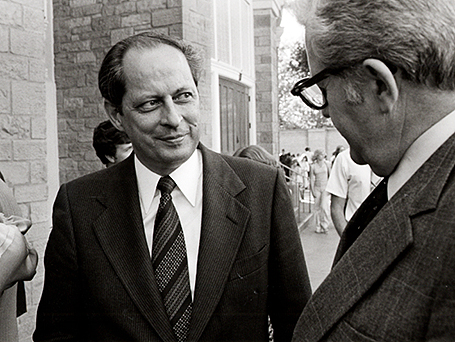
Elder Robert D. Hales outside the Salt Lake Tabernacle during general conference in 1981.
For more than 20 years, Elder Hales’s apostolic witness of the Savior and his testimony of the restored gospel penetrated the hearts of Latter-day Saints throughout the world. His sermons included themes such as family and faith, trials and testimony, love and longsuffering, service and obedience, integrity and agency.
In teaching about the wise use of agency, Elder Hales shared a story about a friend who served with him in the air force.
“While training to be a jet fighter pilot, . . . I practiced deciding when to bail out of an airplane if the fire warning light came on and I began to spin out of control,” he recalled. “I remember one dear friend who didn’t make these preparations. He would find a way out of simulator training and then go to play golf or swim. He never learned his emergency procedures! A few months later, fire erupted in his plane, and it spun toward the ground in flames. Noting the fire warning light, his younger companion, having developed a preconditioned response, knew when to bail out of the plane and parachuted to safety. But my friend who had not prepared to make that decision stayed with the plane and died in the crash.”
Knowing how to act and when to act when an important choice presents itself can have eternal consequences, Elder Hales added.27
“As a New York boy, I grew up as one of only two or three members of the Church in a high school of a few thousand. At a recent 50-year reunion, my former classmates remembered how I lived according to my values and beliefs. I realized then that one infraction of the Word of Wisdom or transgression of moral values would have meant I could never say, ‘This is what I believe’ and be trusted by my friends.
“We can share the gospel only to the extent we live it.”28
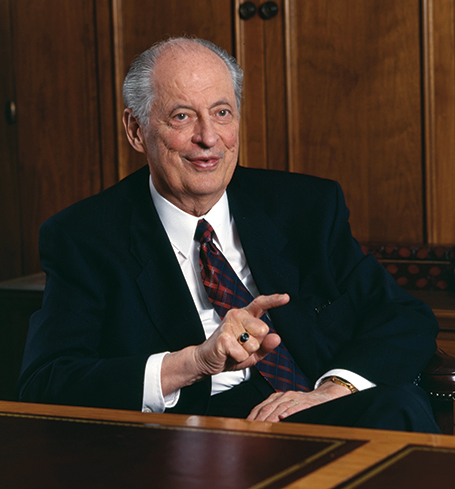
Elder Robert D. Hales talked about integrity and values during a 2005 interview with Church magazines. Photo by Craig Dimond.
During the closing years of Elder Hales’s ministry, he encouraged the Saints to live worthy of “the remarkable gift of the Holy Ghost.”29 He also encouraged Church members to improve their discipleship by becoming better Christians, having Christian courage, and standing strong in holy places.
“This is the call of Christ to every Christian today: ‘Feed my lambs. … Feed my sheep’—share my gospel with young and old, lifting, blessing, comforting, encouraging, and building them, especially those who think and believe differently than we do,” he taught.30
Regarding those who “want us to come down off the high ground and join them in a theological scrum in the mud,” Elder Hales counseled Latter-day Saints to respond with their testimonies and to stand with the Savior.
“We show forth His love, which is the only power that can subdue the adversary and answer our accusers without accusing them in return. That is not weakness. That is Christian courage.”31
Just as the Savior was “despised and rejected of men” (Isaiah 53:3; Mosiah 14:3), Latter-day Saints may also experience misunderstanding, criticism, and false accusations. “It is our sacred privilege to stand with Him!” Elder Hales said.32
Waiting on the Lord
When Elder Hales spoke about waiting on the Lord, he knew his subject well. Heart problems, major surgeries, and renewed health challenges that prevented him from speaking during the April 2011 general conference exacted a physical toll but brought him spiritual insights.
After recovering from three major surgeries in 2000, he told Latter-day Saints: “In the past two years, I have waited upon the Lord for mortal lessons to be taught me through periods of physical pain, mental anguish, and pondering. I learned that constant, intense pain is a great consecrating purifier that humbles us and draws us closer to God’s Spirit.”33

President Thomas S. Monson greets Elder Robert D. Hales during the October 2012 general conference. Photo by August Miller.
We need not face challenges alone because we can appeal to “the ultimate caregiver,” Elder Hales taught.34 “On occasion, when the Lord so desired, I was to be comforted with visitations of heavenly hosts that brought comfort and eternal reassurances in my time of need.”35
Though we may not know when or how our prayers will be answered, Elder Hales testified, answers will come in the Lord’s own way and according to His timetable. “For some answers we may have to wait until the hereafter. . . . Let us not give up on the Lord. His blessings are eternal, not temporary.”36
A Faithful Disciple
As Presiding Bishop, Elder Hales bore a testimony evocative of Alma the Younger. He declared: “Oh, if I had the voice and trump of an angel that I could say to all mankind that [Jesus Christ] is risen and that he lives; that he is the Son of God, the Only Begotten of the Father, the promised Messiah, our Redeemer and Savior; that he came into this world to teach the gospel by example. His divine mission is directed to you and me to come unto him and he will lead us into life eternal.”37
In his first general conference talk after being called to the Quorum of the Twelve Apostles, he quoted Mormon, making that ancient prophet’s testimony his own: “Behold, I am a disciple of Jesus Christ, the Son of God. I have been called of him to declare his word among his people, that they might have everlasting life” (3 Nephi 5:13).38
For nearly four decades as a General Authority, Elder Robert D. Hales boldly and powerfully declared the Savior’s words through his talks and exemplary life. And he remembered his own counsel in his personal, professional, and ecclesiastical life: “Through faithful obedience and enduring to the end, we can one day return with honor back into the presence of our Heavenly Father and his son Jesus Christ.”39
For Latter-day Saints who share his faith in the Savior, Elder Hales is not missing. Rather, he has returned home—and he has done so with honor.
Notes
- Robert D. Hales, “‘What Think Ye of Christ?’ ‘Whom Say Ye That I Am?’” Ensign, May 1979, 79.
- Robert D. Hales, “The Aaronic Priesthood: Return with Honor,” Ensign, May 1990, 39.
- In “Fireside Commemorates Aaronic Priesthood Restoration,” Ensign, July 1985, 75.
- In “Elder Robert D. Hales of the Quorum of the Twelve,” Ensign, May 1994, 105.
- See Robert D. Hales, “How Will Our Children Remember Us?” Ensign, Nov. 1993, 8.
- Robert D. Hales, “Gratitude for the Goodness of God,” Ensign, May 1992, 64.
- Robert D. Hales, “Strengthening Families: Our Sacred Duty,” Ensign, May 1999, 33; Liahona, July 1999, 38.
- See Robert D. Hales, “Gratitude for the Goodness of God,” 63.
- Robert D. Hales, “How Will Our Children Remember Us?” 8–9.
- Robert D. Hales, “Stand Strong in Holy Places,” Ensign or Liahona, May 2013, 48.
- Robert D. Hales, “How Will Our Children Remember Us?” 9.
- In LaRene Gaunt, “Elder Robert D. Hales: ‘Return with Honor,’” Ensign, July 1994, 50.
- See Robert D. Hales, “Celestial Marriage—A Little Heaven on Earth” (Brigham Young University devotional, Nov. 9, 1976), speeches.byu.edu.
- In LaRene Gaunt, “Elder Robert D. Hales: ‘Return with Honor,’” 48.
- Robert D. Hales, “Becoming Provident Providers Temporally and Spiritually,” Ensign or Liahona, May 2009, 8–9.
- See Robert D. Hales, “Gratitude for the Goodness of God,” 65.
- Robert D. Hales, “Gifts of the Spirit,” Ensign, Feb. 2002, 19.
- In LaRene Gaunt, “Elder Robert D. Hales: ‘Return with Honor,’” 51.
- Spencer W. Kimball, in LaRene Gaunt, “Elder Robert D. Hales: ‘Return with Honor,’” 52.
- See LaRene Gaunt, “Elder Robert D. Hales, ‘Return with Honor,’” 52.
- In “Elder Robert D. Hales of the Quorum of the Twelve,” 105–6.
- Interview with President Henry B. Eyring, June 11, 2015.
- In LaRene Gaunt, “Elder Robert D. Hales: ‘Return with Honor,’” 53.
- Robert D. Hales, “Making Righteous Choices at the Crossroads of Life,” Ensign, Nov. 1988, 11.
- Robert D. Hales, “Welfare Principles to Guide Our Lives: An Eternal Plan for the Welfare of Men’s Souls,” Ensign, May 1986, 30.
- Robert D. Hales, “The Unique Message of Jesus Christ,” Ensign, May 1994, 78–79.
- See Robert D. Hales, “To the Aaronic Priesthood: Preparing for the Decade of Decision,” Ensign or Liahona, May 2007, 48–49.
- Robert D. Hales, “Ten Axioms to Guide Your Life,” Ensign, Feb. 2007, 30–31; Liahona, Feb. 2007, 38–39.
- Robert D. Hales, “The Holy Ghost,” Ensign or Liahona, May 2016, 105.
- Robert D. Hales, “Being a More Christian Christian,” Ensign or Liahona, Nov. 2012, 91.
- Robert D. Hales, “Christian Courage: The Price of Discipleship,” Ensign or Liahona, Nov. 2008, 74, 72.
- Robert D. Hales, “Stand Strong in Holy Places,” Ensign or Liahona, May 2013, 50.
- Robert D. Hales, “The Covenant of Baptism: To Be in the Kingdom and of the Kingdom,” Ensign, Nov. 2000, 6; Liahona, Jan. 2001, 6.
- Robert D. Hales, “Healing Soul and Body,” Ensign, Nov. 1998, 16; Liahona, Jan. 1999, 19.
- Robert D. Hales, “The Covenant of Baptism,” Ensign, Nov. 2000, 6; Liahona, Jan. 2001, 6.
- Robert D. Hales, “Waiting upon the Lord: Thy Will Be Done,” Ensign or Liahona, Nov. 2011, 73.
- Robert D. Hales, “What Think Ye of Christ?” New Era, April 1987, 7.
- Robert D. Hales, “The Unique Message of Jesus Christ,” 80; see also Robert D. Hales, “Christian Courage,” 75.
- In LaRene Gaunt, “Elder Robert D. Hales: ‘Return with Honor,’” 53.
Selected Teachings
Eternal Families: “An eternal bond doesn’t just happen as a result of sealing covenants we make in the temple. How we conduct ourselves in this life will determine what we will be in all the eternities to come. To receive the blessings of the sealing that our Heavenly Father has given to us, we have to keep the commandments and conduct ourselves in such a way that our families will want to live with us in the eternities. The family relationships we have here on this earth are important, but they are much more important for their effect on our families for generations in mortality and throughout all eternity” (“The Eternal Family,” Ensign, Nov. 1996, 65).
Faith in Jesus Christ: “When the challenges of mortality come, and they come for all of us, it may seem hard to have faith and hard to believe. At these times only faith in the Lord Jesus Christ and His Atonement can bring us peace, hope, and understanding. Only faith that He suffered for our sakes will give us the strength to endure to the end” (“Finding Faith in the Lord Jesus Christ,” Ensign or Liahona, Nov. 2004, 73).
Provident Living: “All of us are responsible to provide for ourselves and our families in both temporal and spiritual ways. To provide providently, we must practice the principles of provident living: joyfully living within our means, being content with what we have, avoiding excessive debt, and diligently saving and preparing for rainy-day emergencies. When we live providently, we can provide for ourselves and our families and also follow the Savior’s example to serve and bless others” (“Becoming Provident Providers Temporally and Spiritually,” Ensign or Liahona, May 2009, 8).
Trials: “Won’t all of us, sometime, have reason to ask, ‘O God, where art thou?’ [D&C 121:1]. Yes! When a spouse dies, a companion will wonder. When financial hardship befalls a family, a father will ask. When children wander from the path, a mother and father will cry out in sorrow. Yes, ‘weeping may endure for a night, but joy cometh in the morning’ [Psalm 30:5]. Then, in the dawn of our increased faith and understanding, we arise and choose to wait upon the Lord, saying, ‘Thy will be done’ [Matthew 6:10]” (“Waiting Upon the Lord: Thy Will Be Done,” Ensign or Liahona, Nov. 2011, 72).
Discipleship: “To be who Heavenly Father wants us to be, we follow Jesus Christ. I testify that He is continually calling us to follow Him. If you are just learning about the Christian commitment of Latter-day Saints or if you have not been fully participating in the Church and want to follow Him again—fear not! The Lord’s first disciples were all new members of the Church, newly converted to His gospel. Jesus patiently taught each one. He helped them fulfill their responsibilities. He called them His friends and laid down His life for them. And He has already done the same for you and for me” (“Being a More Christian Christian,” Ensign or Liahona, Nov. 2012, 91).
General Conference: “The greatest blessings of general conference come to us after the conference is over. Remember the pattern recorded frequently in scripture: we gather to hear the words of the Lord, and we return to our homes to live them. (“General Conference: Strengthening Faith and Testimony,” Ensign or Liahona, Nov. 2013, 7).
Marriage: “None of us marry perfection; we marry potential. The right marriage is not only about what I want; it’s also about what she—who’s going to be my companion—wants and needs me to be.
“Speaking plainly, please don’t date all through your 20s just to ‘have a good time,’ thus delaying marriage in favor of other interests and activities. Why? Because dating and marriage aren’t final destinations. They are the gateway to where you ultimately want to go”(“Meeting the Challenges of Today’s World,” Ensign or Liahona, Nov. 2015, 46).
Agency: “Remember, no one can reach upward on your behalf. Only your faith and prayers will cause you to lift yourself and have the mighty change of heart. Only your resolve to be obedient can change your life. Because of the Savior’s atoning sacrifice for you, the power is in you [see D&C 58:28]. You have your agency, you have strong testimonies if you are obedient, and you can follow the Spirit that guides you” (“Meeting the Challenges of Today’s World,” Ensign or Liahona, Nov. 2015, 46).
The Holy Ghost: “I remind all of us that the Holy Ghost is not given to control us. Some of us unwisely seek the Holy Ghost’s direction on every minor decision in our lives. This trivializes His sacred role. The Holy Ghost honors the principle of agency. He speaks to our minds and our hearts gently about many matters of consequence [see D&C 8:2–3]” (“The Holy Ghost,” Ensign or Liahona, May 2016, 105).

